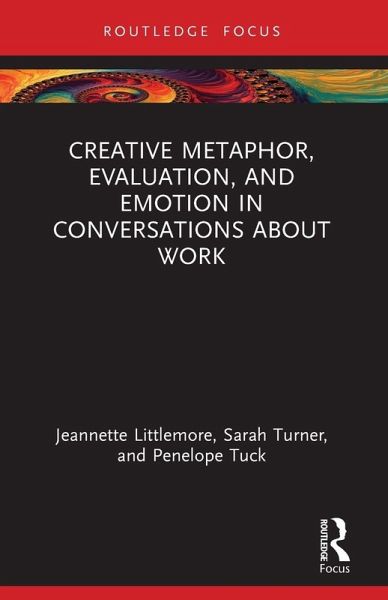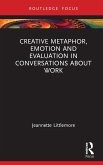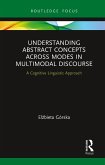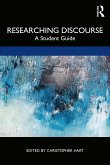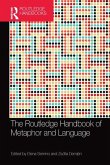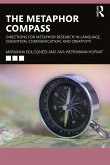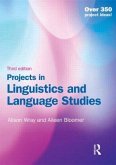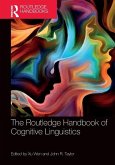Jeannette Littlemore, Sarah Turner, Penelope Tuck
Creative Metaphor, Evaluation, and Emotion in Conversations about Work
Jeannette Littlemore, Sarah Turner, Penelope Tuck
Creative Metaphor, Evaluation, and Emotion in Conversations about Work
- Broschiertes Buch
- Merkliste
- Auf die Merkliste
- Bewerten Bewerten
- Teilen
- Produkt teilen
- Produkterinnerung
- Produkterinnerung
This book explores creative and conventional metaphor within a particular workplace.This book will appeal to researchers interested in better understanding metaphor, creativity, evaluation, and workplace cultures.
Andere Kunden interessierten sich auch für
![Creative Metaphor, Evaluation, and Emotion in Conversations about Work Creative Metaphor, Evaluation, and Emotion in Conversations about Work]() Jeannette LittlemoreCreative Metaphor, Evaluation, and Emotion in Conversations about Work53,99 €
Jeannette LittlemoreCreative Metaphor, Evaluation, and Emotion in Conversations about Work53,99 €![Understanding Abstract Concepts across Modes in Multimodal Discourse Understanding Abstract Concepts across Modes in Multimodal Discourse]() Elzbieta GorskaUnderstanding Abstract Concepts across Modes in Multimodal Discourse32,99 €
Elzbieta GorskaUnderstanding Abstract Concepts across Modes in Multimodal Discourse32,99 €![Researching Discourse Researching Discourse]() Researching Discourse32,99 €
Researching Discourse32,99 €![The Routledge Handbook of Metaphor and Language The Routledge Handbook of Metaphor and Language]() The Routledge Handbook of Metaphor and Language47,99 €
The Routledge Handbook of Metaphor and Language47,99 €![The Metaphor Compass The Metaphor Compass]() Marianna BolognesiThe Metaphor Compass57,99 €
Marianna BolognesiThe Metaphor Compass57,99 €![Projects in Linguistics and Language Studies Projects in Linguistics and Language Studies]() Alison WrayProjects in Linguistics and Language Studies62,99 €
Alison WrayProjects in Linguistics and Language Studies62,99 €![The Routledge Handbook of Cognitive Linguistics The Routledge Handbook of Cognitive Linguistics]() The Routledge Handbook of Cognitive Linguistics49,99 €
The Routledge Handbook of Cognitive Linguistics49,99 €-
-
-
This book explores creative and conventional metaphor within a particular workplace.This book will appeal to researchers interested in better understanding metaphor, creativity, evaluation, and workplace cultures.
Hinweis: Dieser Artikel kann nur an eine deutsche Lieferadresse ausgeliefert werden.
Hinweis: Dieser Artikel kann nur an eine deutsche Lieferadresse ausgeliefert werden.
Produktdetails
- Produktdetails
- Routledge Focus on Applied Linguistics
- Verlag: Taylor & Francis Ltd
- Seitenzahl: 66
- Erscheinungstermin: 19. Dezember 2024
- Englisch
- Abmessung: 216mm x 140mm x 4mm
- Gewicht: 110g
- ISBN-13: 9781032202471
- ISBN-10: 1032202475
- Artikelnr.: 72075345
- Herstellerkennzeichnung
- Libri GmbH
- Europaallee 1
- 36244 Bad Hersfeld
- gpsr@libri.de
- Routledge Focus on Applied Linguistics
- Verlag: Taylor & Francis Ltd
- Seitenzahl: 66
- Erscheinungstermin: 19. Dezember 2024
- Englisch
- Abmessung: 216mm x 140mm x 4mm
- Gewicht: 110g
- ISBN-13: 9781032202471
- ISBN-10: 1032202475
- Artikelnr.: 72075345
- Herstellerkennzeichnung
- Libri GmbH
- Europaallee 1
- 36244 Bad Hersfeld
- gpsr@libri.de
Jeannette Littlemore is a Professor of Applied Linguistics in the Department of English Language and Linguistics at the University of Birmingham, UK. Her research focuses on the role played by creative and conventional metaphor and metonymy in the sharing of emotional experiences. Sarah Turner is an Assistant Professor of Cognitive Linguistics in the Research Centre for Arts, Memory and Communities at Coventry University, UK. Her research focuses on the analysis of figurative language production to provide insights into physical, psychological, and social experiences. Penelope Tuck is a Professor of Accounting, Public Finance, and Policy at Birmingham Business School, University of Birmingham, UK. Her research area is accounting from a social and institutional perspective. She focuses on engaged research and covers sites such as taxation, central government, and the health sector.
Acknowledgements
1. Chapter 1 "I'm sort of running on this soapy conveyor belt with people throwing wet sponges at me and I've got this sodding great elastic band attached to my back"
Why look at creative metaphor
evaluation
and emotion in conversations about work?
The role played by metaphor in the sharing of emotional experiences
Are creative or conventional metaphors more likely to be used for evaluation?
Is (creative) metaphor more likely to be used for positive or negative evaluation?
Previous studies of the role played by metaphor in the workplace
and the approach taken in this study
A final (but important) comment on the nature of 'creative metaphor'
The context of the study
Research questions
2. Chapter 2 "I'm surprised anybody can hear anything going on for the crashing of all of these elephants in the room": Methodology and taxonomy of creative metaphor types
Introduction
Participants and interview procedure
Procedure used for the identification of metaphor
Procedure used for the identification of creative uses of metaphor and taxonomy of creative uses of metaphor
Procedure used for the identification of positive and negative evaluation
Conclusion
3. Chapter 3 "She did the traditional sort of chuck it all up in the air
so get all the deckchairs and throw them up in the air
cause chaos for a year and a half and then leave": To what extent are creative metaphors used to perform evaluation and how do creative and conventional metaphors relate to one another?
Introduction
To what extent is metaphor used to express evaluation in conversations about work? Is the use of metaphor more likely to be associated with positive or negative evaluation? And do creative and conventional metaphor differ in terms of the extent to which they express (positive or negative) evaluation?
Which metaphors were used to perform what kinds of evaluation
and how were they employed?
Conclusion
4. Chapter 4 Conclusion: "As people rotate round
some will spin off the merry-go-round and shoot off back to the private sector"
Conclusion
1. Chapter 1 "I'm sort of running on this soapy conveyor belt with people throwing wet sponges at me and I've got this sodding great elastic band attached to my back"
Why look at creative metaphor
evaluation
and emotion in conversations about work?
The role played by metaphor in the sharing of emotional experiences
Are creative or conventional metaphors more likely to be used for evaluation?
Is (creative) metaphor more likely to be used for positive or negative evaluation?
Previous studies of the role played by metaphor in the workplace
and the approach taken in this study
A final (but important) comment on the nature of 'creative metaphor'
The context of the study
Research questions
2. Chapter 2 "I'm surprised anybody can hear anything going on for the crashing of all of these elephants in the room": Methodology and taxonomy of creative metaphor types
Introduction
Participants and interview procedure
Procedure used for the identification of metaphor
Procedure used for the identification of creative uses of metaphor and taxonomy of creative uses of metaphor
Procedure used for the identification of positive and negative evaluation
Conclusion
3. Chapter 3 "She did the traditional sort of chuck it all up in the air
so get all the deckchairs and throw them up in the air
cause chaos for a year and a half and then leave": To what extent are creative metaphors used to perform evaluation and how do creative and conventional metaphors relate to one another?
Introduction
To what extent is metaphor used to express evaluation in conversations about work? Is the use of metaphor more likely to be associated with positive or negative evaluation? And do creative and conventional metaphor differ in terms of the extent to which they express (positive or negative) evaluation?
Which metaphors were used to perform what kinds of evaluation
and how were they employed?
Conclusion
4. Chapter 4 Conclusion: "As people rotate round
some will spin off the merry-go-round and shoot off back to the private sector"
Conclusion
Acknowledgements, 1. Chapter 1 "I'm sort of running on this soapy conveyor belt with people throwing wet sponges at me and I've got this sodding great elastic band attached to my back", Why look at creative metaphor, evaluation, and emotion in conversations about work?, The role played by metaphor in the sharing of emotional experiences, Are creative or conventional metaphors more likely to be used for evaluation?, Is (creative) metaphor more likely to be used for positive or negative evaluation?, Previous studies of the role played by metaphor in the workplace, and the approach taken in this study, A final (but important) comment on the nature of 'creative metaphor', The context of the study, Research questions, 2. Chapter 2 "I'm surprised anybody can hear anything going on for the crashing of all of these elephants in the room": Methodology and taxonomy of creative metaphor types, Introduction, Participants and interview procedure, Procedure used for the identification of metaphor, Procedure used for the identification of creative uses of metaphor and taxonomy of creative uses of metaphor, Procedure used for the identification of positive and negative evaluation, Conclusion, 3. Chapter 3 "She did the traditional sort of chuck it all up in the air, so get all the deckchairs and throw them up in the air, cause chaos for a year and a half and then leave": To what extent are creative metaphors used to perform evaluation and how do creative and conventional metaphors relate to one another?, Introduction, To what extent is metaphor used to express evaluation in conversations about work? Is the use of metaphor more likely to be associated with positive or negative evaluation? And do creative and conventional metaphor differ in terms of the extent to which they express (positive or negative) evaluation?, Which metaphors were used to perform what kinds of evaluation, and how were they employed?, Conclusion, 4. Chapter 4 Conclusion: "As people rotate round, some will spin off the merry-go-round and shoot off back to the private sector", Conclusion
Acknowledgements
1. Chapter 1 "I'm sort of running on this soapy conveyor belt with people throwing wet sponges at me and I've got this sodding great elastic band attached to my back"
Why look at creative metaphor
evaluation
and emotion in conversations about work?
The role played by metaphor in the sharing of emotional experiences
Are creative or conventional metaphors more likely to be used for evaluation?
Is (creative) metaphor more likely to be used for positive or negative evaluation?
Previous studies of the role played by metaphor in the workplace
and the approach taken in this study
A final (but important) comment on the nature of 'creative metaphor'
The context of the study
Research questions
2. Chapter 2 "I'm surprised anybody can hear anything going on for the crashing of all of these elephants in the room": Methodology and taxonomy of creative metaphor types
Introduction
Participants and interview procedure
Procedure used for the identification of metaphor
Procedure used for the identification of creative uses of metaphor and taxonomy of creative uses of metaphor
Procedure used for the identification of positive and negative evaluation
Conclusion
3. Chapter 3 "She did the traditional sort of chuck it all up in the air
so get all the deckchairs and throw them up in the air
cause chaos for a year and a half and then leave": To what extent are creative metaphors used to perform evaluation and how do creative and conventional metaphors relate to one another?
Introduction
To what extent is metaphor used to express evaluation in conversations about work? Is the use of metaphor more likely to be associated with positive or negative evaluation? And do creative and conventional metaphor differ in terms of the extent to which they express (positive or negative) evaluation?
Which metaphors were used to perform what kinds of evaluation
and how were they employed?
Conclusion
4. Chapter 4 Conclusion: "As people rotate round
some will spin off the merry-go-round and shoot off back to the private sector"
Conclusion
1. Chapter 1 "I'm sort of running on this soapy conveyor belt with people throwing wet sponges at me and I've got this sodding great elastic band attached to my back"
Why look at creative metaphor
evaluation
and emotion in conversations about work?
The role played by metaphor in the sharing of emotional experiences
Are creative or conventional metaphors more likely to be used for evaluation?
Is (creative) metaphor more likely to be used for positive or negative evaluation?
Previous studies of the role played by metaphor in the workplace
and the approach taken in this study
A final (but important) comment on the nature of 'creative metaphor'
The context of the study
Research questions
2. Chapter 2 "I'm surprised anybody can hear anything going on for the crashing of all of these elephants in the room": Methodology and taxonomy of creative metaphor types
Introduction
Participants and interview procedure
Procedure used for the identification of metaphor
Procedure used for the identification of creative uses of metaphor and taxonomy of creative uses of metaphor
Procedure used for the identification of positive and negative evaluation
Conclusion
3. Chapter 3 "She did the traditional sort of chuck it all up in the air
so get all the deckchairs and throw them up in the air
cause chaos for a year and a half and then leave": To what extent are creative metaphors used to perform evaluation and how do creative and conventional metaphors relate to one another?
Introduction
To what extent is metaphor used to express evaluation in conversations about work? Is the use of metaphor more likely to be associated with positive or negative evaluation? And do creative and conventional metaphor differ in terms of the extent to which they express (positive or negative) evaluation?
Which metaphors were used to perform what kinds of evaluation
and how were they employed?
Conclusion
4. Chapter 4 Conclusion: "As people rotate round
some will spin off the merry-go-round and shoot off back to the private sector"
Conclusion
Acknowledgements, 1. Chapter 1 "I'm sort of running on this soapy conveyor belt with people throwing wet sponges at me and I've got this sodding great elastic band attached to my back", Why look at creative metaphor, evaluation, and emotion in conversations about work?, The role played by metaphor in the sharing of emotional experiences, Are creative or conventional metaphors more likely to be used for evaluation?, Is (creative) metaphor more likely to be used for positive or negative evaluation?, Previous studies of the role played by metaphor in the workplace, and the approach taken in this study, A final (but important) comment on the nature of 'creative metaphor', The context of the study, Research questions, 2. Chapter 2 "I'm surprised anybody can hear anything going on for the crashing of all of these elephants in the room": Methodology and taxonomy of creative metaphor types, Introduction, Participants and interview procedure, Procedure used for the identification of metaphor, Procedure used for the identification of creative uses of metaphor and taxonomy of creative uses of metaphor, Procedure used for the identification of positive and negative evaluation, Conclusion, 3. Chapter 3 "She did the traditional sort of chuck it all up in the air, so get all the deckchairs and throw them up in the air, cause chaos for a year and a half and then leave": To what extent are creative metaphors used to perform evaluation and how do creative and conventional metaphors relate to one another?, Introduction, To what extent is metaphor used to express evaluation in conversations about work? Is the use of metaphor more likely to be associated with positive or negative evaluation? And do creative and conventional metaphor differ in terms of the extent to which they express (positive or negative) evaluation?, Which metaphors were used to perform what kinds of evaluation, and how were they employed?, Conclusion, 4. Chapter 4 Conclusion: "As people rotate round, some will spin off the merry-go-round and shoot off back to the private sector", Conclusion

